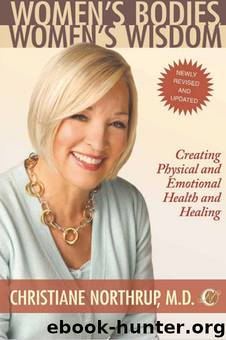Women's Bodies, Women's Wisdom by Christiane Northrup

Author:Christiane Northrup [Northrup, Christiane]
Language: eng
Format: epub
Tags: Health; Fitness & Dieting, Women's Health, General, Personal Health, Professional & Technical, Medical eBooks, Specialties, Obstetrics & Gynecology
Amazon: B003QXMYZC
Publisher: Hay House
Published: 2010-06-01T16:00:00+00:00
PREVENTING PREMATURE BIRTH
Despite a great deal of research in this area, the rate of premature birth hasn’t declined in the past fifty years. It occurs in about 13 percent of pregnancies and contributes to more infant deaths than any other factor except severe birth defects.18 Assisted reproductive technologies have increased the number of multiple gestations—and thus increased the number of premature babies. The increasing popularity of labor inductions has played a part, too; we are now seeing an increase in late-term prematurity (thirty-seven weeks or so), which puts far too many babies in the intensive care unit because of problems with lung maturity. These induction-related prematurities would be preventable if women were encouraged to go into labor normally.19
Though many drugs have been used to try to stop labor, these have only limited benefit and haven’t significantly affected the prematurity rate. Until the mind-body-lifestyle connection in premature birth is addressed, the rate is unlikely to change. It is well documented that uterine blood vessels are exquisitely sensitive to the effects of sympathetic nervous system stimulation and that the hormones associated with stress of all types can cause changes in blood flow to the fetus.20
In a study of sixty-four women, for instance, Lewis Mehl-Madrona, M.D., Ph.D., found that a range of the psychological factors (fear, anxiety, and stress; lack of support from the woman’s partner; poor maternal self-identity; negative beliefs about birth; and lack of support from friends and fam ily) predicted deliveries that required obstetrical intervention ranging from cesarean section to oxytocin augmentation or induction. In an other study, hypnotherapy was found to play a statistically significant role in preventing negative emotional factors from leading to C-section or oxytocin augmentation or induction. Dr. Mehl-Madrona has also used hyp notherapy to help women avoid giving birth prematurely. Each woman who received hypnotherapy was reassured that she was doing the best she could, asked to state what her stresses were, and then given the sug gestion that her body would know what to do to keep her baby safe. As fear and anxiety decreased through supportive hypnotherapy, so did adverse outcomes.21
One study followed women with a history of three consecutive miscarriages for which no medical cause could be found. On their subsequent pregnancy, they had a suture placed in their cervix to hold the pregnancy in place. Eighty-nine percent of these women went on to have severe postpartum depression, compared with only 11 percent of the control group who experienced mild to moderate depression. The authors of this study concluded that “these women were forced into motherhood.”22 When severe emotional conflicts about motherhood aren’t dealt with consciously, they can be exacerbated postpartum and result in emotional breakdown. It is clear that adverse pregnancy outcomes could be prevented with approaches that help a woman name and work through the particular stresses that can so profoundly affect her pregnant body and her unborn baby.
One of the most underacknowledged but important factors in poor pregnancy outcome is that the pregnancy is unwanted or unplanned or there is some unrecognized ambivalence around it.
Download
This site does not store any files on its server. We only index and link to content provided by other sites. Please contact the content providers to delete copyright contents if any and email us, we'll remove relevant links or contents immediately.
Name Book, The: Over 10,000 Names--Their Meanings, Origins, and Spiritual Significance by Astoria Dorothy(2987)
Tone Your Tummy Type by Denise Austin(2846)
The Ultimate Guide to Anal Sex for Women by Tristan Taormino(2298)
The Expectant Father by Armin A. Brott & Jennifer Ash(2272)
The Coregasm Workout by Debby Herbenick(2272)
The Women's Health Fitness Fix by Jen Ator(2241)
Expecting Better by Emily Oster(2212)
She-ology by Sherry A. Ross MD(2165)
The Hite Report on Shere Hite by Shere Hite(2064)
Woman: An Intimate Geography by Natalie Angier(1939)
8 Steps to Reverse Your PCOS by Fiona McCulloch(1914)
Birth by Tina Cassidy(1903)
The Female Brain by M.D. Louann Brizendine(1899)
101 Get-Lean Workouts and Strategies by Muscle & Fitness(1868)
Women & the Weight Loss Tamasha by Diwekar Rujuta(1801)
50 Ways to Soothe Yourself Without Food by Susan Albers(1792)
The Big Booty Blueprint: Your Guide To A Bigger Butt In Less Than 12 Weeks by Bella Rahbek & Brandon Carter(1671)
The overachievers by Robbins Alexandra(1577)
Unleash the Power of the Female Brain: Supercharging Yours for Better Health, Energy, Mood, Focus, and Sex by Daniel G. Amen M.D(1576)
